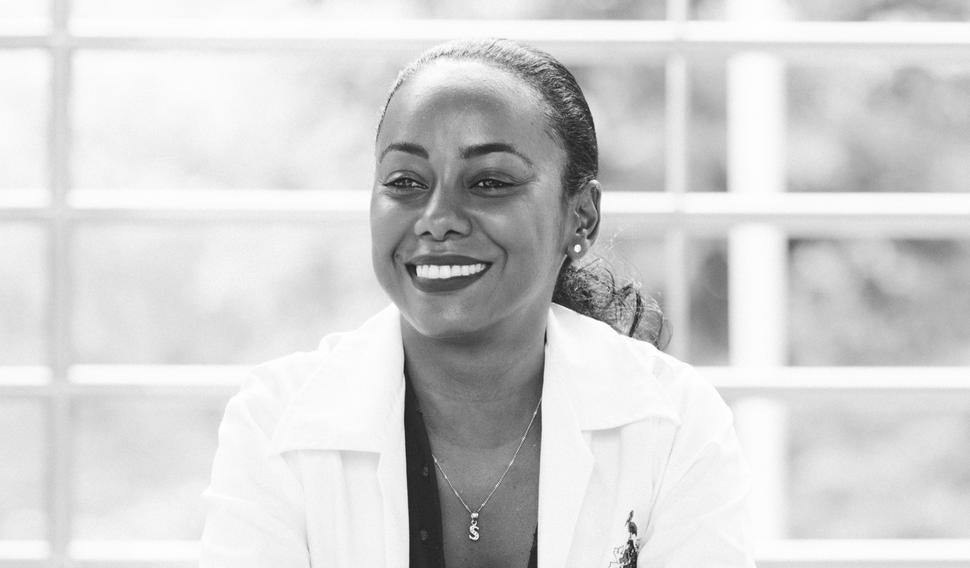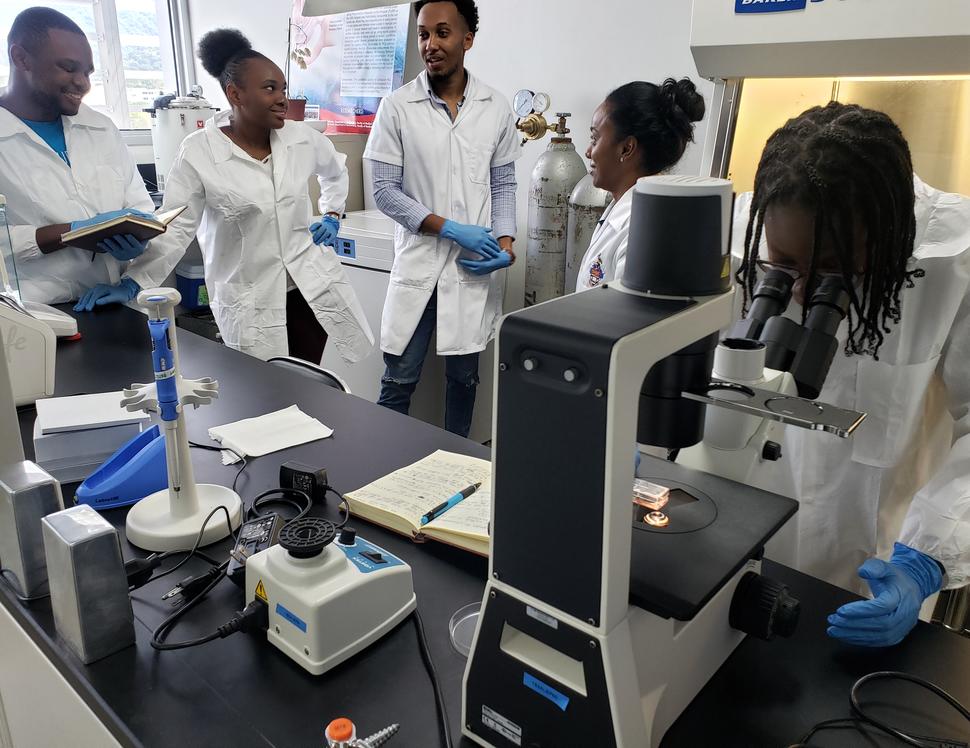Grantee Spotlight: Simone Badal, Ph.D.
, by Center for Global Health Staff
As part of a new monthly blog series, Grantee Spotlight: Research in the Making, NCI's Center for Global Health will feature NCI-funded grantees and trainees working in global cancer research in low- and middle-income countries (LMICs).
Note: The views expressed here are those of the grantees and do not represent any official position of the National Cancer Institute.
Novel Prostate Cancer Cell Lines to Address Prostate Cancer Disparity in Black Men
Dr. Simone Badal is a senior lecturer with the University of the West Indies, Mona, Jamaica, and is an early career investigator in the Emerging Research Scholar Program (K43) led by NIH’s Fogarty International Center. Dr. Badal’s research is based on the hypothesis that to fully benefit from cell line-based drug screening, a representative cell line panel that captures various types of prostate cancers, as well as differences in ancestry, is necessary. There continues to be limited representation of prostate cancer materials from men of African ancestry (MAA) when compared to men of European ancestry (MEA), and there are almost no cell models available derived from MAA. This makes it difficult to assess the efficacy of potential treatments in MAA versus MEA, contributing to a problem in health disparities. To address this problem, Dr. Badal devised a project that will generate prostate cancer cell lines from the Caribbean and the team has recently developed the first prostate cancer cell line, ACRJ-PC28 from a Jamaican man of African ancestry.
What motivated you to pursue your research topic?
A portion of my Ph.D. focused on identifying Jamaican drug candidates with potential anticancer properties using popular in vitro cell line models. From our findings, we recognized several promising molecules that were more effective and safer in reducing the viability of cancer cells compared to known drugs. As I evaluated my data with fresh eyes, in preparation for a grant application to support the next stage in drug development, in vivo research, I realized that all the cell lines used in my study were Caucasian in origin. This prompted me to search for cell lines representative of African ancestry, specifically, from the Caribbean. Unfortunately, there were none. As a result, I shifted my immediate focus from in vivo work to developing novel cell lines from the Caribbean that we could use to understand cancers specific to our people and I chose to begin with prostate given that it is a major cause of concern. For the past six years, my lab has focused on developing a novel methodology since current methodologies proved unsuccessful. I am happy to report that we have created the first Caribbean cell line, ACRJ-PC28. We are seeking a patent and our publication is now under review. All this has been possible through local funding and more recently, NIH funding - the Emerging Global Leader Award.
What inspired you to choose the setting where you are working?
My work is being conducted in my home country. While I have been privileged to be exposed to other institutions abroad where my research skillsets have been broadened, there has always been a desire to build or expand our research capacity and output at home. Perhaps, it would have been easier to build my scientific career in a place that offered cutting-edge research facilities, but I understood from early on out that sacrifices were necessary. I’m happy I persisted as I am able to prove to upcoming young scientists that despite the difficulties, we can build on what we have, successfully compete for research support, and build our capacity as a cutting-edge anticancer laboratory.
What were some of the challenges that you faced and lessons you learned from your project?
Developing the first Caribbean cell line, ACRJ-PC28 was no easy feat. As a matter of fact, for the first three years, we achieved no success. Through consultations with persons who were in the field, noteworthy scientists from premier institutions, the primary advice I was given was to explore other options as developing cell lines was beyond challenging. Most expressed that they tried it and it did not work, so they moved on. I was convinced that the lack of representation of these tools for our people was unacceptable and if the narrative was to change, then I would have to change it. This meant that I had to persevere and recognize that it would not happen overnight. Each failure was a learning moment for me and my team, and I should recognize my Ph.D. student, Henkel Valentine who was diligent in his efforts. I continued and used the advice of my peers carefully - we read more and expanded the boundaries with success. ACRJ-PC28, the first prostate cancer Caribbean cell line, was developed.
How do you hope your work will advance the field of global cancer research/support cancer control efforts?
This is the first cell line from the Caribbean, specifically a prostate cancer cell line, ACRJ-PC28. We have developed a novel methodology that we believe will advance the development of prostate cancer cell lines in general and one we will use to build our library of prostate cancer cell lines. We are already on our way to developing the second, ACRJ-PC29. Cell line development has advanced the understanding of signaling pathways and target molecules associated with either cancer causation and progression or its prevention. The utilization of cell lines has and continues to provide the first phase for anticancer drug screens which has led to many clinical trial discoveries. Despite the many attempts to develop Prostate cancer cell lines globally, only two are of African ancestry and available in public repositories for testing. Our novel cell line, and unique methodology will, through the consolidated efforts of scientists globally, advance personalized treatments for Black men with prostate cancer.
What are some opportunities/unanswered questions in global cancer research in your setting?
Jamaica boasts many natural and synthetic lead molecules but without the proper infrastructure, we have been limited in reaping the full benefits of these lead molecules. In some instances, we have through bilateral collaborative efforts, addressed some of these questions. There is however a level of hesitation and apprehension by many local investigators to engage in some of these collaborative efforts given past experiences of loss of intellectual property or share in rewards of research outcomes. I believe this has contributed to the lack of full exploration of research benefits. Perhaps it can be addressed by equipping ourselves with basic infrastructure. For example, an in vivo lab that could aid in maximizing preclinical screens on our lead molecules.
Please share some interesting facts and pictures about the setting where you work.
Established in 1948, the University of the West Indies (UWI) is the largest and longest-standing higher education provider in the English-speaking Caribbean. The UWI has evolved from a university college of London in Jamaica with 33 medical students in 1948 to an internationally respected, regional university with near 50,000 students and five campuses: Mona in Jamaica, St. Augustine in Trinidad and Tobago, Cave Hill in Barbados, Five Islands in Antigua and Barbuda, and an Open Campus.
Would you share a reflection on your career path?
Life is all about balance. It is important to listen to others who have gone ahead and succeeded in their respective STEM fields. To achieve balance, we need to first recognize what we like and don’t like, and why we feel this way. Second, reading and exposing oneself to as many people and things is necessary. When the moments get challenging, and they will, there are some answers that will come from other people, but some, only we will know.
Recent Publications:
1. Zhao Z, Fowle H, Valentine H, Liu Z, Tan Y, Pei J, Badal S, Testa J, Grana. Immortalization of human primary prostate epithelial cells via CRISPR inactivation of the CDKN2A locus and expression of telomerase. Nature Prostate Cancer and Prostatic Diseases, 2020.
2. Badal S, Aiken W, Morrison B, Valentin H, Bryan S, Gachi A and Ragin C. Disparities in prostate cancer incidence and mortality rates: solvable or not? The Prostate. 2020 80:3-16.
3. Badal S, Campbell KS, Valentine H, Ragin C. The need for cell lines from diverse ethnic backgrounds for prostate cancer research. Nat Rev Urol. 2019 16:691–692.

